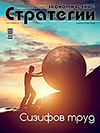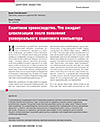Quantum Supremacy. What Awaits Civilization After the Emergence of a Universal Quantum Computer
With exponentially accelerating scientific and technological progress, quantum technologies are gaining new impetus and promise the solution of numerous tasks that previously were not amenable to solution within the framework of “traditional” computing models. The consequences of the second quantum revolution will affect all spheres of life. Such branches as material science, nanotechnology, pharmacology, simulation of chaotic dynamic processes, etc. will gain new development. At the same time, quantum technologies carry certain risks and threats, in particular, the scrapping of all systems based on modern achievements in cryptography. The article gives a brief description of the current state of quantum technologies and the forecast of their development in terms of impact on various aspects of human civilization.
References:
- Gon alves C.P. Quantum Cybernetics and Complex Quantum Systems Science — A Quantum Connectionist Exploration. NeuroQuantology, 2014, 13(1), February 2014.
- Fedorov A. Kvantovyy komp’yuter: bol’shaya igra na povyshenie [Quantum Computer: a Big Bull Speculation]. Blog kompanii Yandeks, 2017, available at: https://habrahabr.ru/company/yandex/blog/332106/
- Bennett C.H., Brassard G. Quantum Cryptography: Public Key Distribution and Coin Tossing. Proceedings of International Conference on Computers, Systems & Signal Processing, Dec. 9–12, 1984, Bangalore, India. IEEE, 1984.
- Proctor T.J., Knott P., Dunningham J. Multi-parameter estimation in net-worked quantum sensors, 2017.
- Trabesinger A. Quantum computing: towards reality. Nature 543(7646):S1-S1. March 2017.
- Dario G. The Future of Computing: AI and Quantum. IEEE Industry Summit on the Future of Computing, 2017, November, 10.
- Manin Yu.I. Vychislimoe i nevychislimoe [Computable and Non-computable]. Moscow, Sovetskoe radio, 1980, 128 p.
- Feynman R. Simulating Physics with Computers, Int. J. Theor. Phys. 21, 467 (1982).
- Deutsch D. The Church-Turing principle and the universal quantum computer. In: Proceedings of the Royal Society of London A. 400, 1985.
- Jordan S. Quantum Algorithm Zoo. Comprehensive catalog of quantum algorithms, NIST, 2013, available at: https://math.nist.gov/quantum/zoo/
- Valiev K.A. Kvantovye komp’yutery: mozhno li ikh sdelat’ “bol’shimi”? [Quantum Computers: Can We Make Them “Big”?]. UFN, 1999, t. 169, pp. 691–694.
- Zurek W. Reduction of the Wave Packet: How Long Does It Take? In Frontiers of Nonequilibrium Statistical Physics. Edited by P. Meystre and M. O. Scully. New York: Plenum, 1984.
- Zurek W. Decoherence and the Transition from Quantum to Classical — Revisited. Los Alamos Science, 2002, no 27.
- Dushkin R.V. Kvantovye vychisleniya i funktsional’noe programmirovanie [Quantum Computing and Functional Programming]. Moscow, DMK Press, 2015, 232 p.
- Shor P.W. Polynomial-Time Algorithms for Prime Factorization and Discrete Logarithms on a Quantum Computer. Foundations of Computer Science: Conference Publications, 1997.
- Valiev K.A., Kokin A.A. Kvantovye komp’yutery: nadezhdy i real’nost’ [Quantum Computers: Expectations and Reality]. Izhevsk, RKhD, 2004, 320 p.
- Preskill Dzh. Kvantovaya informatsiya i kvantovye vychisleniya [Quantum Information and Quantum Computing]. Izhevsk, RKhD, 2008–2011. 464+312 p.
- Penrouz R. Teni razuma: V poiskakh nauki o soznanii [Shadows of the Mind: A Search for the Missing Science of Consciousness]. Moscow, Izhevsk, IKI, 2011, 688 p.



